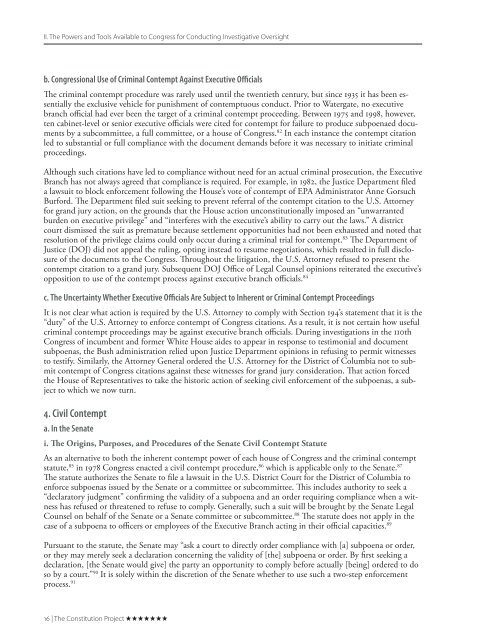When Congress Comes Calling
WhenCongressComesCalling
WhenCongressComesCalling
You also want an ePaper? Increase the reach of your titles
YUMPU automatically turns print PDFs into web optimized ePapers that Google loves.
II. The Powers and Tools Available to <strong>Congress</strong> for Conducting Investigative Oversight<br />
b. <strong>Congress</strong>ional Use of Criminal Contempt Against Executive Officials<br />
The criminal contempt procedure was rarely used until the twentieth century, but since 1935 it has been essentially<br />
the exclusive vehicle for punishment of contemptuous conduct. Prior to Watergate, no executive<br />
branch official had ever been the target of a criminal contempt proceeding. Between 1975 and 1998, however,<br />
ten cabinet-level or senior executive officials were cited for contempt for failure to produce subpoenaed documents<br />
by a subcommittee, a full committee, or a house of <strong>Congress</strong>. 82 In each instance the contempt citation<br />
led to substantial or full compliance with the document demands before it was necessary to initiate criminal<br />
proceedings.<br />
Although such citations have led to compliance without need for an actual criminal prosecution, the Executive<br />
Branch has not always agreed that compliance is required. For example, in 1982, the Justice Department filed<br />
a lawsuit to block enforcement following the House’s vote of contempt of EPA Administrator Anne Gorsuch<br />
Burford. The Department filed suit seeking to prevent referral of the contempt citation to the U.S. Attorney<br />
for grand jury action, on the grounds that the House action unconstitutionally imposed an “unwarranted<br />
burden on executive privilege” and “interferes with the executive’s ability to carry out the laws.” A district<br />
court dismissed the suit as premature because settlement opportunities had not been exhausted and noted that<br />
resolution of the privilege claims could only occur during a criminal trial for contempt. 83 The Department of<br />
Justice (DOJ) did not appeal the ruling, opting instead to resume negotiations, which resulted in full disclosure<br />
of the documents to the <strong>Congress</strong>. Throughout the litigation, the U.S. Attorney refused to present the<br />
contempt citation to a grand jury. Subsequent DOJ Office of Legal Counsel opinions reiterated the executive’s<br />
opposition to use of the contempt process against executive branch officials. 84<br />
c. The Uncertainty Whether Executive Officials Are Subject to Inherent or Criminal Contempt Proceedings<br />
It is not clear what action is required by the U.S. Attorney to comply with Section 194’s statement that it is the<br />
“duty” of the U.S. Attorney to enforce contempt of <strong>Congress</strong> citations. As a result, it is not certain how useful<br />
criminal contempt proceedings may be against executive branch officials. During investigations in the 110th<br />
<strong>Congress</strong> of incumbent and former White House aides to appear in response to testimonial and document<br />
subpoenas, the Bush administration relied upon Justice Department opinions in refusing to permit witnesses<br />
to testify. Similarly, the Attorney General ordered the U.S. Attorney for the District of Columbia not to submit<br />
contempt of <strong>Congress</strong> citations against these witnesses for grand jury consideration. That action forced<br />
the House of Representatives to take the historic action of seeking civil enforcement of the subpoenas, a subject<br />
to which we now turn.<br />
4. Civil Contempt<br />
a. In the Senate<br />
i. The Origins, Purposes, and Procedures of the Senate Civil Contempt Statute<br />
As an alternative to both the inherent contempt power of each house of <strong>Congress</strong> and the criminal contempt<br />
statute, 85 in 1978 <strong>Congress</strong> enacted a civil contempt procedure, 86 which is applicable only to the Senate. 87<br />
The statute authorizes the Senate to file a lawsuit in the U.S. District Court for the District of Columbia to<br />
enforce subpoenas issued by the Senate or a committee or subcommittee. This includes authority to seek a<br />
“declaratory judgment” confirming the validity of a subpoena and an order requiring compliance when a witness<br />
has refused or threatened to refuse to comply. Generally, such a suit will be brought by the Senate Legal<br />
Counsel on behalf of the Senate or a Senate committee or subcommittee. 88 The statute does not apply in the<br />
case of a subpoena to officers or employees of the Executive Branch acting in their official capacities. 89<br />
Pursuant to the statute, the Senate may “ask a court to directly order compliance with [a] subpoena or order,<br />
or they may merely seek a declaration concerning the validity of [the] subpoena or order. By first seeking a<br />
declaration, [the Senate would give] the party an opportunity to comply before actually [being] ordered to do<br />
so by a court.” 90 It is solely within the discretion of the Senate whether to use such a two-step enforcement<br />
process. 91<br />
16 | The Constitution Project


